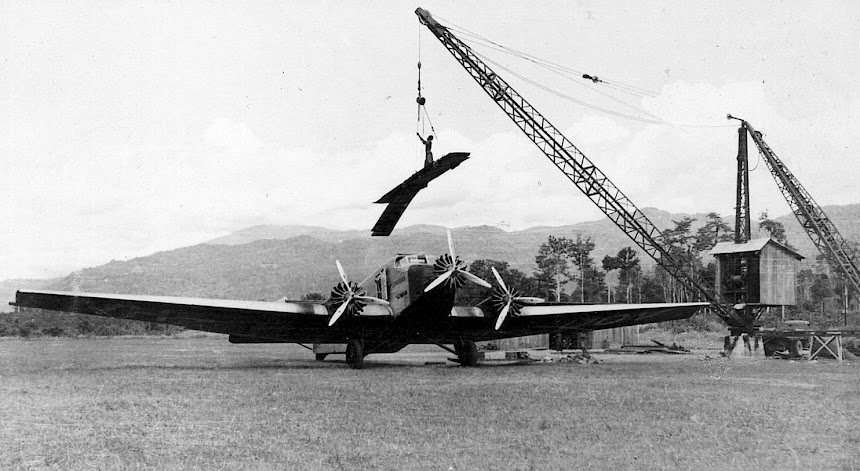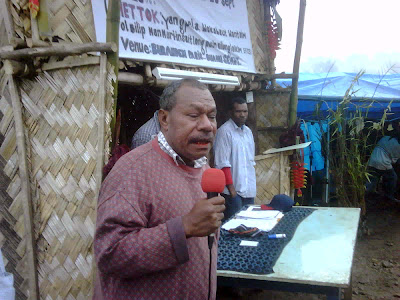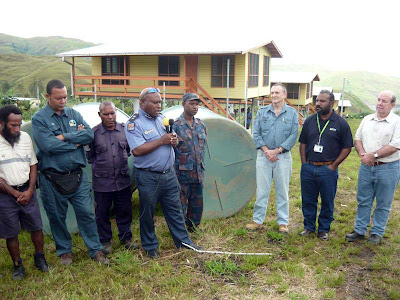By MALUM NALU
Minister for Environment and Conservation Benny Allan and his secretary Dr Wari Iamo have been asked to explain to mining-affected communities along the Watut River of Morobe province to explain how the environment audit of Hidden Valley Mine will be conducted.
The Union of Watut River Communities (UoWRC) said the river people had patiently waited for the minister’s commitment to fufil but nothing had eventuated.
“The UoWRC has also blamed the Mineral Resources Authority (MRA), Department of Mining and the Health Department for ignoring the suffering of the silent majority by allowing the foreign-owned Harmony Gold and Newcrest Mining to regulate their own action in the Hidden Valley Mining,” said UoWRC president Reuben Mete.
“The UoWRC has now served a 14-day notice starting Friday, Sept 24 to Friday, Oct 8, for the authorities to respond favorably to their request of having an initial collaborative dialogue as soon as possible or they would refrain from working with the government and will address the issues their own way.”
In a letter to Allan dated Sept 20, 2010, Mete said their disappointments were well-echoed by Harmony chief executive Graham Briggs on Oct 26, 2009, admitting that “higher-than-expected sediment impacts in the Watut River had affected the Watut River communities”.
“The Hidden Valley Gold Mining Environmental Impact Statement (EIS) approved by your department, which predicted that sediment load in the Watut River during construction will be of minimum, is now of great concern for the riverine communities who entirely rely on the Watut River,” he said.
“This now leads us to question the credibility of the Department of Environment and Conservation (DEC) and the manner in which they have taken in the issuing of the environmental permit to the Hidden Valley Gold Mine for construction and operation.
“The issuing of the environmental permit by the DEC and mining license (ML) 151 by the Department of Mining granted in March 2005, eight months before the actual approval of the environmental management plan (EMP) by the DEC in Nov 2005 indicated that the DEC has issued the riverine communities with a ‘death warrant’.”
Mete told Allan that a letter to UoWRC by his department dated Oct 1, 2009, assured the Watut River communities that a state team comprising DEC and MRA would review all their claims as per their petition dated Sept 11, 2009.
He said DEC and MRA said they would advise on ways which the government could address their concerns both currently and into the future “which has now been a completely-misleading assurance to us as to this date, nothing constructive by your department nor the MRA or the so called ‘state team’ have materialised”.
“Also, lack of detailed response provided to the Watut river communities within the available 12-month period timeframe, lack of reviews and/or investigation of all of our allegations as per the initial petition last September, reflect how your department and the other relevant government agencies have turned a blind eye on us, the rural people at the bottom in this matter, to amicably address it,” Mete said.
“In addition to this, an environmental audit commission by your department to review the environmental performance of Hidden Valley Mine and investigate those concerns raised on the effects of mine-derived sediment awarded to the Snowy Mountains Engineering Corporation (SMEC) on Watut River systems is now a wonder to us as we are now into six months past the set date of Feb 22, 2010.
“We would therefore appreciate if your department and other relevant government agencies such as the Department of Mining and MRA could hold an initial collaborative dialogue with us, the UoWRC executives, as soon as possible to find a common way to resolve our concerns within 14 days given period.
“A joint attention through dialogue and understanding is needed as the Watut River communities cannot be patient and be cooperative after the given date.”





























































